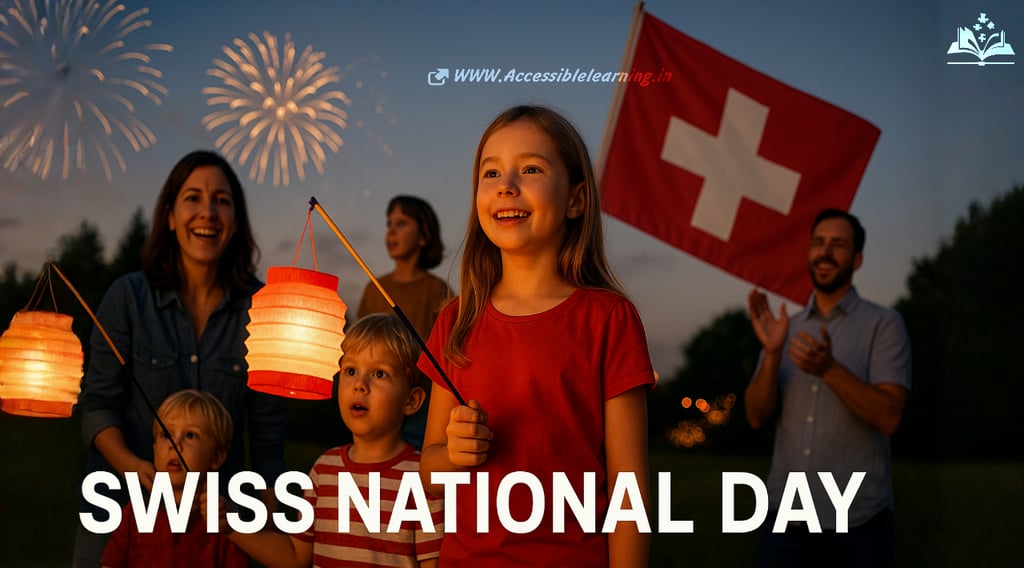
Swiss National Day (August 1): History, Traditions & Celebrations
Celebrate Swiss National Day on August 1 with bonfires, alphorn music, and lanterns. Discover its deep history, cultural significance, and modern relevance.
CULTURE/TRADITIONCELEBRATION/FESTIVALSEUROPEAN UNION
Kim Shin
7/26/20254 min read


What is Swiss National Day?
Swiss National Day, celebrated on August 1st each year, marks the founding of the Swiss Confederation in 1291—a pivotal moment in the country’s history. On this day, representatives from the cantons of Uri, Schwyz, and Unterwalden came together to form a defensive alliance, laying the foundation for what is now modern Switzerland.
Recognized officially as a national holiday in 1891 (600th anniversary) and declared a public holiday in 1994, the day symbolizes freedom, unity, neutrality, and democracy—the core values of Swiss identity.
Historical Background
The roots of Swiss National Day lie in the Federal Charter of 1291 (Bundesbrief), signed on the Rütli Meadow near Lake Lucerne. The document represented an oath of mutual defense among the three cantons against external domination, particularly from the Habsburg Empire.
This pact laid the groundwork for a confederation that would eventually expand to include 26 cantons, evolving into the Swiss federal republic known today for its neutrality and decentralized governance.
How the Swiss Celebrate National Day
Unlike larger parades or commercial festivities seen in other countries, Swiss National Day is more intimate and community-oriented. Here's how it’s celebrated:
Bonfires & Fireworks
From the Alps to lakeside villages, bonfires are lit to symbolize freedom and the old tradition of sending smoke signals through the mountains. Fireworks fill the night sky, especially in cities like Zurich, Lucerne, and Geneva.
Paper Lantern Processions
Children and families carry colorful paper lanterns through towns, often singing patriotic songs. This simple tradition reflects warmth and togetherness.
Rütli Meadow Speech
Each year, a federal councilor gives a speech at the historic Rütli Meadow, the birthplace of the Swiss Confederation—reinforcing national values and unity.
Swiss Feast
Traditional foods such as raclette, fondue, rösti, cervelat sausages, and Alpine cheeses are served. Local wines and baked goods also take center stage during picnics and public gatherings.
Alphorn Music and Yodeling
Cultural performances like Alphorn players, flag twirlers (Fahnenschwinger), and yodelers bring the essence of Swiss folk tradition alive.
Nature Celebrations
Many locals head to the mountains, lakes, or countryside to hike and celebrate with scenic views of the Alpine landscape.
The Human Side of Swiss National Day
Swiss National Day isn’t just about history—it’s about shared values. Despite the country’s diversity of languages (German, French, Italian, and Romansh), Swiss National Day unites people under a single identity.
It reflects
Democracy & Decentralization: Each canton has its voice and governance.
Neutrality: Switzerland’s tradition of peace and mediation is globally respected.
Cultural Richness: Blending traditions from different linguistic and cultural regions.
For Swiss citizens abroad, embassies and expat groups host events, maintaining the emotional and cultural connection with the homeland.
Interesting Facts About Swiss National Day
No Military Parades: Unlike many countries, Switzerland focuses on peace, not military strength.
Silent Fireworks Movement: Due to environmental and animal welfare concerns, some cantons are moving toward eco-friendly or silent fireworks.
Grassroots Celebrations: Many events are organized by local communities rather than national government bodies.
2024 Theme: Recent celebrations have leaned into sustainability and cultural diversity as central themes.
Challenges & Modern Issues
In recent years, climate change, noise pollution, and inclusivity have influenced how the holiday is observed. Some towns opt for LED light shows over fireworks, while debates arise around civic engagement and youth participation in national traditions.
Switzerland also faces an evolving identity in the face of globalization and immigration. National Day now offers a chance to foster dialogue and unity across generations and backgrounds.
Swiss National Day is more than a historical anniversary—it's a living celebration of a unique nation built on collaboration, diversity, and freedom. Whether you're enjoying fondue in Zurich, lighting a lantern in Geneva, or listening to Alphorns echo in the Alps, August 1st is a heartfelt reminder of what it means to be Swiss.


FAQs
Q: Why is Swiss National Day celebrated on August 1st?
August 1 marks the signing of the Federal Charter of 1291, when the cantons of Uri, Schwyz, and Unterwalden formed a mutual alliance. This event is considered the founding moment of the Swiss Confederation.
Q: Is Swiss National Day a public holiday?
Yes, Swiss National Day became an official public holiday in 1994. Most businesses and government offices remain closed, and it is a non-working day across all cantons.
Q: How do the Swiss traditionally celebrate National Day?
The celebrations include bonfires, fireworks, lantern processions, folk music, patriotic speeches, and traditional Swiss foods like fondue and cervelat. Families often celebrate in the countryside or mountains.
Q: What is the significance of the Rütli Meadow?
The Rütli Meadow is believed to be the historic site where the founding oath of the Swiss Confederation was sworn in 1291. It is a key location for speeches and symbolic celebrations on August 1.
Q: Do all regions of Switzerland celebrate the day the same way?
No, celebrations may vary by canton and linguistic region. However, the core themes of unity, democracy, and cultural pride remain consistent nationwide.
Q: Are there eco-friendly alternatives to fireworks in Switzerland?
Yes. In recent years, some towns have opted for silent fireworks, drone shows, or light projections to reduce noise and environmental impact.
Q: Is Swiss National Day celebrated outside of Switzerland?
Absolutely. Swiss embassies and consulates, as well as expat communities around the world, host events to mark the occasion with traditional food, music, and cultural displays.
Subscribe To Our Newsletter
All © Copyright reserved by Accessible-Learning Hub
| Terms & Conditions
Knowledge is power. Learn with Us. 📚


